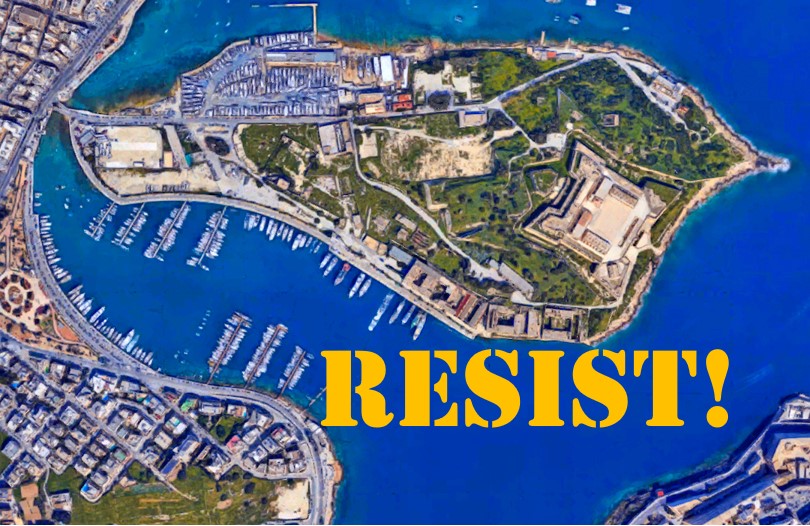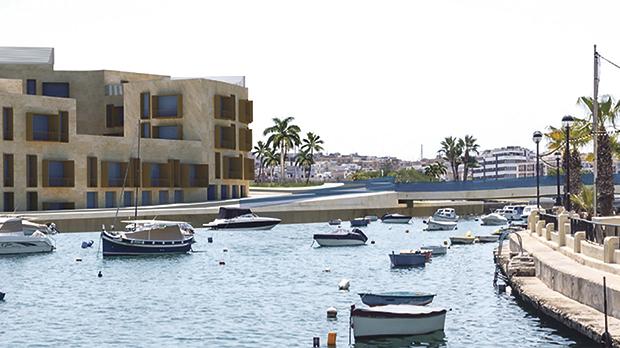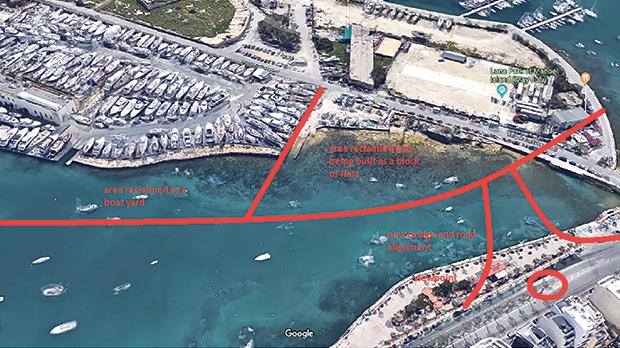
The newly established pressure group Inħobbu l-Gżira believes that the amended Manoel Island masterplan still needs to change. The members of the group are concerned about the impact of the development on the community’s wellbeing.
by Michael Sciortino, Jamie Mercieca. Interviewed by Raisa Galea.
[dropcap]I[/dropcap]n 2000, development consortium MIDI was granted a 99-year concession on Manoel Island. Apart from an extensive residential and commercial complex across the large part of the island and a yacht marina, original development plans included a hotel and casino at the historic Lazaretto, which were dropped in 2017, following the pressure from residents, local council and NGOs.
However, the newly established pressure group Inħobbu l-Gżira believes that the amended masterplan still needs to change. Approximately half of the Gżira promenade is set to become a bridge connecting Manoel Island with Gżira. The members of the group are concerned about the impact of the development on the community’s wellbeing.
Raisa Galea: Could you please tell me more about Inħobbu l-Gżira. What is your goal?
Michael Sciortino: Inħobbu l-Gżira was born specifically as a response to the proposed MIDI masterplan for Manoel Island. This masterplan does not consider the needs and amenity of the Gżirjani or of the town itself.
This group was set up now because the leaders of the group had never met before. The core members met at the Planning Board meeting and we got together to push for changes in the plan. The vast majority of the people in Gżira had no idea what the plans involved.
[beautifulquote align=”left” cite=””]This development is based on a idea mooted nearly 30 years ago, in 1990. The brief was issued over a quarter century ago way back in 1992.[/beautifulquote]
I’d like to point out that this development is based on a idea mooted nearly 30 years ago, in 1990. The development brief was issued over a quarter century ago way back in 1992. At the time, Malta was a very different place, and at the time there was a great need to expand tourism and development. The world economy was in recession and unemployment was high. I was unemployed for a while at the time despite having professional qualifications. Job opportunities were scarce. It was a much different Malta.
The current masterplan is still based on those ideas which are now grossly out of date. The North Harbour Local Plan published in 2006 described Sliema as an ageing town with a declining population. Today, describing Sliema and Gżira as towns in decline would be simply ridiculous.
The North Harbour Area has increased tremendously in population density. Gżira alone is being torn apart wholesale. The population has changed as well. Gone are many a working class family that made Gżira socially homogeneous. Now it is home to a large young cosmopolitan population with no community ties.
[beautifulquote align=”left” cite=””]The area does not need further economic stimulus but more leisure facilities and open spaces where people can break from the pressures of the highly urbanised town.[/beautifulquote]
Therefore, the area does not need further economic stimulus but more leisure facilities and open spaces where people can break from the pressures of the highly urbanised town, disrupted by traffic and the construction boom. Manoel Island would have been an ideal recreation area. But that is not going to happen if the country keeps enthralled by the power of money.

RG: In your objections to the MIDI plans, you chose to emphasize the social consequences of this development. You state that the project will create a space of peace for the privileged caste, while causing mayhem to the rest of the residents. This is a truly democratic concern which ought to be heard. Could you please elaborate on these concerns?
MS: The concept of the project is that of a luxury enclave in Marsamxett harbour. It is based on exclusivity and not inclusivity. There are no plans for community facilities for the residents of Gzira—only high end commercial establishments.
[beautifulquote align=”left” cite=””]The concept of the project is based on exclusivity and not inclusivity. It is indeed something similar to a gated community.[/beautifulquote]
It is indeed something similar to a gated community. In fact, while it is calling for a prohibition of cars on the island, the roads will still be used by an elite. These are all in the Project Development Statement prepared by Foster + Partners. They make it clear that none of the workers will be able to live in this enclave.
Mayhem for the rest is based on the fact that this enclave will bear none of the pressures being faced by the whole of Sliema Creek. These pressures are from a burgeoning population, tourism and other business interests. For example, the number of harbour cruise boats have been increasing yearly, putting pressure on the seafront for berths, boxes for ticket touts (of which there are now over 50), parking slots for buses and coaches bringing tourists to board boats and picking them up afterwards. There are night party boats which are the most noisy.
None of these will be allocated to berths on Manoel Island. Nothing will be allowed to disturb the peace of the enclave. Only the residents of Sliema and Gzira will have to deal with the disturbance.

Another aspect to keep in mind is that such developments make no allowance for affordable housing as happens in London or New York. Moreover, these developments exacerbate income inequality, which further undermines social cohesion.
However, these are long-term problems which the current political culture does not understand.
Neither of the two parties ever speak of the widening income inequality that is happening. The explosion in property values widens the gap between those with a foot on the property ladder and those without property. Even those with a single property are not better off as selling off one’s property buys just another one. Thus, selling a house to a developer buys a flat somewhere else with some money left over. People might feel richer that way but in reality there is a hidden cost that they are now living in a shared block with others rather than in their own house.
[beautifulquote align=”left” cite=””]The last time any party in Malta spoke of social justice was in the nineties.[/beautifulquote]
The last time any party in Malta spoke of social justice was in the nineties. Nowadays, the phrase is considered as a blasphemy and you end up being called a ‘commie’.
In any case, the pressure group Inħobbu l-Gżira is not the forum aiming for social or economic change at large. Our target is civic amenities for the town. At the moment, Inħobbu l-Gżira is engaged in preserving—and possibly enhancing—the town’s limited open spaces, the long range landscapes across Marsamxett Harbour and the recreational and leisure facilities mainly consisting of the promenade in Triq ix-Xatt. Needless to say, this promenade is popular with locals and tourists alike all year round but especially in summer.

Jamie Mercieca: I believe that issues such as public health—both mental and physical—are nowhere near the top of the political agenda.
The extrusion of the yacht yard from its current location places it directly under the balconies and windows of Strand residents, meaning that in addition to the exhaust currently created by traffic congestion, residents will also have to deal with sand blasting, boat spraying, noise and light pollution.
The parking and mobility problems, which are already almost unbearable in this area, will be aggravated for the duration and after the completion of each phase of the project.
RG: Did you receive support from the local council? Considering that such campaign can easily be appropriated to abet partisan agendas, what is your position on working with political parties?
MS: This issue cuts across the political divide. So far, support for Inħobbu l-Gżira has been widespread while opposition is coming from the local council from councillors across the political divide.
I am sorry to say that not only has the local council not been supportive, but opposed our demands vociferously. What is wrong with defending the promenade and the long range open views across the harbour? Unfortunately, the people of Gżira were kept in the dark with regards to the plans. This is not a recent phenomenon. The same thing happened twenty years ago when the original outline development plan was approved. Nobody knows what the 20 year old plans look like.

RG: Did you receive support from the residents of other towns?
MS: Support is arriving from all around Malta and even from many foreigners. It is no surprise since the promenade from Gżira to Sliema is very popular with residents from interior towns in Malta. People from Qormi, Birkirkara, Hamrun and many other towns enjoy the unique views offered by Marsamxett harbour, especially in summer. It is popular with families, and the benches along the promenade are in high demand. It is as popular as Għar-id-Dud.
JM: In less than two days, we approached thirty residents with a petition to the Local Council for an information meeting about the ‘actual’ extent of the project. Everyone signed! More and more people get in touch to learn about the masterplan and our pressure group via the Facebook page Inhobbu l-Gzira.
No further concessions to MIDI. Leave Gzira shoreline alone. It is not private property!